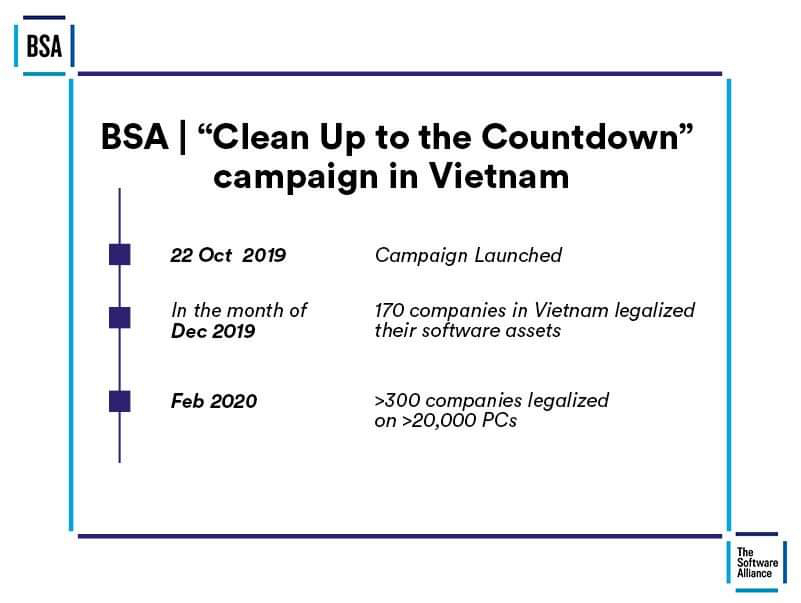Hundreds of corporations in Viet Nam transition to legal software, but warns of ongoing risks: BSA
Hundreds of corporations in Viet Nam improved their cyber security and legal compliance by replacing illegal software with fully licensed programmes since the launch of BSA’s ASEAN software legalisation campaign in September of last year.

Hundreds of corporations in Viet Nam improved their cyber security and legal compliance by replacing illegal software with fully licensed programmes since the launch of BSA’s ASEAN software legalisation campaign in September of last year.
BSA | The Software Alliance reports that over the last six months, more than 300 corporations in Viet Nam legalised all software on more than 20,000 PCs. The majority of these are based in HCM City, but corporations also legalised assets in 12 other cities and provinces including Ha Noi, Dong Nai, Binh Duong, Hai Phong, Vinh Phuc, Hung Yen, Lam Dong, An Giang, Quang Tri, Bac Ninh, Thanh Hoa and Ba Ria-Vung Tau.
BSA states that these results benefit both Viet Nam’s business community and the general public.
Illegal software is notorious for leaving corporations vulnerable to security breaches. The banking, finance, tech and e-commerce sectors in Viet Nam are especially at-risk, given the personal customer data stored within their IT systems.
BSA credits the Vietnamese authorities, including the Ministry of Culture, Sports and Tourism, for conducting thorough nationwide inspections of corporations thought to be using illegal software. In 2019, the ministry conducted dozens of inspections and found violations among both Vietnamese and foreign-run corporations. With the Lunar New Year holiday season now complete, BSA believes that the government has an opportunity to step up its enforcement activities in the coming months.
Since January 2018, copyright infringement is a criminal offense in Viet Nam, with punishment up to VND3 billion and a two-year suspension of business license for commercial entities.
“The 300 corporations that recently legalised their software represent a step in the right direction and an immediate security upgrade, which is great news for Vietnamese consumers who benefit from the data protection provided by legal software,” said Tarun Sawney, Senior Director, BSA.
“However, thousands of corporations in Vietnam continue to rely on illegal software to operate their businesses, so clearly more CEOs in Viet Nam need to proactively address the ongoing use of illegal software.”
Sawney indicated that there are plans to target Viet Nam’s banking, finance, e-commerce, and tech sectors for further legalisations, and that consumer protection groups should take note of how illegal software jeopardizes consumer privacy protections. Among the risks associated with unlicensed software, unauthorised access by hackers and loss of data both directly impact consumer well-being.
BSA’s software legalisation campaign aims to educate CEOs about the variety of risks linked to use of illegal software, including cyber security vulnerabilities and financial liability for copyright infringement, and to persuade them to comply with the law before inspections become necessary.
Viet Nam’s software legalisation is currently trailing other ASEAN countries, where CEOs have been more proactive at managing software to ensure legality. According to the BSA Global Software Survey 2018, the rate of unlicensed software usage in Vietnam is 74 per cent, while the average rate for Asia Pacific is 57 per cent.
Governments across ASEAN, including Viet Nam, agree that high levels of illegal software are a national security threat, and that corporations have a responsibility to manage their software. Together with BSA, these governments are cooperating to enforce software copyright laws, and CEOs who do not legalize their corporate software can face penalties and legal action. — VNS





